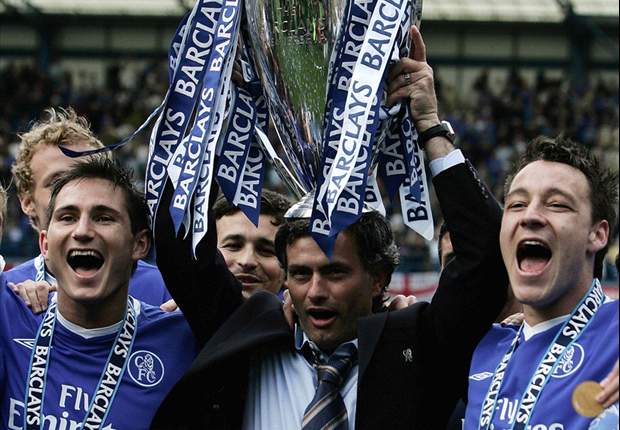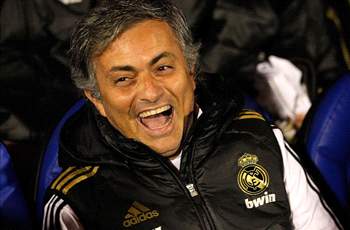
With the Portuguese's reign at Real Madrid far from
the disaster it has been painted as, he returns to Chelsea an even
better coach than when he arrived so spectacularly in 2004
There is a perception that Jose Mourinho is returning to Chelsea as damaged goods following a disappointing, fractious and trophyless final season with Real Madrid. Where once he bathed in the media spotlight and adulation, more recently, at the Santiago Bernabeu, he was agitated and under-fire, battling external criticism and internal disharmony.
The irrepressible, debonair showman has gone, say some, and in his place is a chastened shadow of the self-proclaimed 'Special One' – a vacant chair in press conferences filled instead by assistant manager Aitor Karanka – a greyer, older, less absorbing and illuminating character. A failure, even.
| STILL THE SPECIAL ONE? | |
 |
|
| MOURINHO'S MADRID RECORD | |
| GAMES MANAGED WINS LOSSES GOALS SCORED GOALS CONCEDED GOAL DIFFERENCE WIN % GOALS PER GAME LIGA POINTS PER GAME TROPHIES |
178 128 22 475 168 +307 71.9% 2.67 2.43 3 |
He leaves the Spanish capital having posted the highest win rate (71.9 per cent) of any manager to have taken charge of more than 50 games for the club - in fact, only at Porto did Mourinho boast a higher win percentage (73%) in his entire career. In La Liga alone, the Portuguese's win rate bumps up to 76%.
Despite turmoil within his own camp, infamously dropping captain and icon Iker Casillas, Mourinho still collected 85 points in his final season with Madrid - just four points fewer than Manchester United's title-winning haul (though Madrid scored 0.5 goals per game more than the Red Devils and beat them in the Champions League).
On top of that, he went toe-to-toe with one of the most frightening and creatively well-endowed club sides in football history, Pep Guardiola's Barcelona. Not only did Mourinho end their domestic stranglehold (winning the league in 2011-12 and ending Madrid's 18-year wait for the Copa), but he also outscored the Catalan giants over the course of his three seasons.
Far from leaving the Bernabeu empty-handed and with his tail between his legs, he departs having written himself into the history books with a host of records that even Barca and talisman Lionel Messi (who scored at a rate of 1.48 goals per game last season) could not usurp.
Mourinho's Madrid hold the record for the most goals scored in a 38-game season (121) and the best goal difference in a season (+89) – both came in the title-winning 2011-12 season – as well as setting (and now sharing alongside Barca) the record for most wins (32) and most points (100 – which represented an astonishing 87.72% of all points that were available) in a single season.
Detractors will point to La Liga's duopoly, the stranglehold the top two have over the rest of the league; but if a division's competitiveness is judged by how many sides ended the season with a positive goal difference, then, in the top five leagues in Europe, only Ligue 1 saw more sides finish with a positive record (nine) than the Spanish league (eight).
The only prize that eluded Mourinho during his stay, the one he was predominantly recruited to win, was the Champions League.
Yet, under his stewardship, Madrid reached the last four in each of his three seasons at the club. They ended up one goal shy against Borussia Dortmund last season, went out on penalties against Bayern Munich in 2011-12, and were beaten by a burst of Messi magic against eventual winners Barca the year before that. Fine margins indeed.
A year ago Mourinho was at the peak of his powers having dismantled the Camp Nou steamroller in spectacular, free-flowing fashion and had been duly rewarded with an extended contract. 12 months later and there's suddenly a suggestion that he is no longer the manager he once was. As if.
With Mourinho at the helm, Chelsea look the most fearsome proposition in the Premier League, very much the team to beat next season. The 50-year-old, in the absence of Sir Alex Fergsuon, is far and away the manager with the greatest pedigree. Against his likely title challengers, Arsene Wenger, Manuel Pellegrini and David Moyes, Mourinho has only lost once in 23 encounters, boasting a goal difference of +30.
In the maiden year of his first stint at the club, Chelsea ran away with the league, racking up a 12-point gap to Wenger's second-placed, and previously invincible, Arsenal. From the most wins and points in a Premier League season (29 and 95 respectively) to the fewest goals conceded and most clean sheets (15 and 24), no side has yet managed to better, or even equal, many of the west London club's records under Mourinho.
And now, frighteningly, Chelsea have appointed a better Mourinho this time around than the one that burst onto the scene in 2004. Nine years ago he had tasted success only with Porto, now he has a holy trinity (or "grand slam", as he calls it) of title wins from England, Spain and Italy. The inherent pragmatism has been diluted, replaced by more attacking intent and creativity.
The manager himself has matured – he is less volatile, less egotistical, and even the self-aggrandising monologues have been dialled down (distancing himself from the Super Cup reunion with new Bayern boss Guardiola that has garnered such a buzz).
There's always been something incredibly short term about Mourinho, but, now, it feels like he has returned home to roost. Any perceived dimming of his aura is merely wishful thinking, and he remains a brilliant, intelligent, boundary-pushing manager. And if, as he professes, he has returned to Stamford Bridge in his "best moment", then Chelsea will be a force to be reckoned with next season.


No comments:
Post a Comment